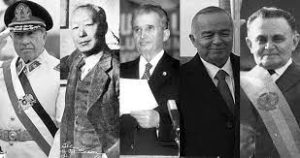 In the world’s most enduring stories, moral certainty is the secret sauce. We take comfort in a nice, clear dividing line between Right & Wrong.
In the world’s most enduring stories, moral certainty is the secret sauce. We take comfort in a nice, clear dividing line between Right & Wrong.
David vs. Goliath, white hats vs. black hats, Ivan Drago vs. Rocky Balboa. And the God-vs.-Satan story, which has kept Big Religion afloat for millennia.
It’s especially gratifying to root for our team together with our fellows, which is why spectator sports are so cathartic. As a plus, we get to indulge in forgetting. The worries of the work week are forgotten by the cheering crowd, and the winning team is absolved of former failures. Past humiliations are redeemed. 
On the same page
War, too, is a big unifying story. And like a good soccer game, the war in Ukraine has offered Americans a tacit release from the discomforts of our own unresolved past, now being drowned out in the roar of mass moral identification. As a plus, it has given us something on which to agree, a great relief in times of savage polarization.
An unusual outpouring of global compassion has arisen for the victims of the invasion. It has been linked by astrologers to the current transits in Pisces, which signal a yearning to dissolve into mass emotion. The conjunction is relatively rare, as is this degree of empathy on the part of Americans for non-Americans.
It’s said that the first casualty of war is Truth. But what, exactly, is the truth? Its malleability gets in the way, when we’re looking for simple answers to catastrophic problems.
Perhaps a better contender for the first casualty of war is complexity.
Shining city
A couple of generations ago, the big unifying story was the Allies vs. the Axis powers, a tale that has achieved the  timeless status of legend.(1)
timeless status of legend.(1)
The next big story — also still with us — was The West: good/ The East: bad. Reagan’s scriptwriters framed it as The Shining City on a Hill (us) prevailing over The Evil Empire (them). Imagery straight out of a fairy tale.
After 9/11, Dubya Bush gave us a new story: the “war on terror,” a phrase extravagantly and ingeniously vague. It was paired with with a new way of referring to the enemy: “bad guys,” a signal that our propaganda had regressed to kindergarten level. But most Americans ate it up, along with the stories about mushroom clouds and yellow cake uranium.
Even now, after the political lies that launched that war have become common knowledge, and the military contracts and oil profits have come to light, many Americans remember what happened in Iraq as a white-hat-vs.-black-hat situation. “At least we got rid of Saddam Hussein.”
military contracts and oil profits have come to light, many Americans remember what happened in Iraq as a white-hat-vs.-black-hat situation. “At least we got rid of Saddam Hussein.”
Nobody wants to think of their country as having caused billions of tax-dollars’-worth of wasted resources and unimaginable human suffering.
Who wouldn’t prefer to live in a shining city on a hill?
Heroes and villains
 We’d much rather mourn the victims of some other superpower than deal with the wreckage we left behind. Vicariously exulting in the hero-vs-villain story, Americans are focused right now on Volodymyr Zelensky, seen here cannily posing in military garb.
We’d much rather mourn the victims of some other superpower than deal with the wreckage we left behind. Vicariously exulting in the hero-vs-villain story, Americans are focused right now on Volodymyr Zelensky, seen here cannily posing in military garb.
The ruling Brits must be similarly relieved right now (did you catch John Oliver’s hilarious takedown of William-&-Kate’s visit to Jamaica?), along with all the other Great Powers whose colonial atrocities are, for the moment, erased from the global mind.(2)
Spin
We’ve been hearing a lot about the evils of propaganda lately. In other countries, that is. Uncle Sam’s own storytelling machine, which has far more finesse, muscle and money than China’s or Russia’s, hums along all but unnoticed. (3)
From across the political spectrum, media anchors are smugly excoriating the disinformation campaign with which Putin is spinning his “special military operation.”
campaign with which Putin is spinning his “special military operation.”
Alas, no such skepticism is heard in reference to our own presidents’ toppling of democratically-elected governments all over the globe (Iran in 1953, Guatemala in 1954, Chile in 1973, etc. ad nauseum). The CIA’s operations, declassified years later if we hear about them at all, are respectfully reported as “regime change” and “nation-building.”
The Kremlin’s crude euphemisms pale beside the smooth styling the Pentagon came up with: “exporting democracy.”
 Staggering hypocrisy
Staggering hypocrisy
To build a proper myth, a government needs an ignorant public.
In a recent monolog, Stephen Colbert ruefully pointed out how insane it was that the UN couldn’t declare Putin a war criminal because Russia itself sits on the Security Council. It seemed not to occur to him that the same irony has applied, for some time, to the rest of the world’s inability to prosecute the Pentagon’s war crimes.
If the Nuremberg laws were applied, then every postwar American president would have been hanged. —Noam Chomsky
Whether it occurred to Colbert’s writers or not, they were doubtless betting it wouldn’t occur to the audience.
Media programming depends upon our failure to remember even the most recent history. If the US public were better informed, Condoleezza Rice going on TV to denounce Putin for “overthrowing sovereign governments” would have been met with howls of derisive outrage.
Even though the pre-emptive war pretext Putin invoked was identical to the one Rice, her boss George Bush, and current media hero David Frum deployed to attack Iraq, there will be an effort now to hammer home with younger audiences especially that Putin’s war is the worst violent break of the international order since the Sudetenland. For people like Rice and Frum, Ukraine is a ticket to absolution. – Matt Taibbi 3/1/22
Americans who are now recoiling, appropriately, at photos of dead children in Bucha and Kramatorsk had no such response a few years ago, when Iraqi children were dying like flies from drinking contaminated water after Uncle Sam poisoned Baghdad’s water system. But those photos weren’t on the news.
Does the villainy of the US government make Putin’s any less abominable? It does not. An atrocity is an atrocity no matter where it occurs. But if our goal is seeking meaning in these horrors, we can’t even begin without first breaking free of collective hypocrisy.
Our moral condemnation of other countries such as Russia would be stronger, not weaker, if we paired it with a recognition of what we ourselves do… – Glenn Greenwald
Prometheans
Thankfully, every society gives rise to Uranian voices, to help the group mind break free. The astrologer Rick Tarnas links these folks to the archetype of Prometheus (literally, forward-thinker). Questioning the official narrative is their job.
…[E]ven if Russia was not ruled by a corrupt authoritarian leader like Vladimir Putin, Russia, like the United States, would still have an interest in the security policies of its neighbors. Does anyone really believe that the United States would not have something to say if, for example, Mexico was to form a military alliance with a US adversary? – Bernie Sanders
Promethean thinkers are fiercely resisted by majority opinion. They are often met with outright punishment, as was the original dude on the rock who met with that unpleasantness from the  eagle.
eagle.
The first salvo against those who complicate the dominant story is, invariably, that they’re “siding with the enemy.” Noam Chomsky has been hit with this accusation for decades. But he is too dry and rational to “side” with anybody. As a realist, his focus is not on what should happen, geopolitically, but on what is actually happening.
For example, he has pointed out that NATO, supposedly designed to protect the West against the spread of Soviet communism, has nonetheless continued to exist, long after the fall of the Berlin Wall. He proposes that we look at what NATO does rather than what it says, whereupon it would be clear that it exists to control the global energy and financial systems, and to serve as a US intervention force.
Confident that the public will not question its message drift, NATO makes no secret of having expanded right up to the borders of Russia. The significance of this encroachment may be lost on Americans, but clearly it is not lost on the territorially obsessive Putin.
His invasion of Ukraine is absolutely a war crime. But it is no surprise. Pundits who refer to it as “coming out of nowhere” are being disingenuous in the extreme. (4)
Pimps of war
At this writing, the world is at a knife’s-edge juncture point. We’re in desperate need of intelligent voices, but are hearing instead from ignorant and unscrupulous politicians trying to use Ukraine as a political football. And from the familiar rogues’ gallery of “experts” (5) promoting the same nonsense that has led to every Pentagon misadventure in recent memory.
It does not matter how wrong they are, how absurd their theories…or how many murderous military interventions go bad. …The same cabal of war mongering pundits, foreign policy specialists and government officials, year after year, debacle after debacle, smugly dodge responsibility for the military fiascos they orchestrate. [S]hifting adroitly with the political winds, moving from the Republican Party to the Democratic Party and then back again, mutating from cold warriors to neocons to liberal interventionists. … They are pimps of war, puppets of the Pentagon…and the defense contractors who lavishly fund their think tanks. …– Chris Hedges
Meanwhile, the censorship campaign against the Prometheans is escalating with alarming speed. Condemned by party-liners from both left and right, Chris Hedges and Glenn Greenwald have been censored for being “Russian assets” and removed from their publishing outlets. Indeed, whole platforms are being shut down.
In early March, barely a week after Russia’s invasion of Ukraine, the twenty-seven nation European Union — citing “disinformation” and “public order and security” — officially banned the Russian state-news outlets from being heard anywhere in Europe. … Twitter, with no explanation as usual, suddenly banned one of the most informative, reliable and careful dissident accounts, named “Russians With Attitude.” – Glenn Greenwald
You don’t need to be pro-Russian to be blacklisted by the Western powers. Merely expressing skepticism about the NATO narrative is cause for banishment. You can get banned for viewpoint-error .
.
It should be obvious that an explanation of Putin’s motives is not the same thing as a justification of them, but audiences are presumed to be too dense to understand the difference. Journalists who try to fill us in on the recent history of Ukraine, such as investigative journalist Aaron Maté, who writes about Washington’s involvement in the coup that toppled Viktor Yanukovych in 2014, are being shut down faster than you can say Joe McCarthy.
Also under fire is Matt Taibbi, who spent years reporting from Russia, warning us about Putin’s rise:
… we already tried regime change in Russia.…it ended with Vladimir Putin in power. Not as an accident, or as the face of a populist revolt against Western influence — that came later — but precisely because we made a long series of intentional decisions to help put him there.
[The media is depicting Putin] as an unspeakable evil whose origins are a taboo subject. Anyone who even brings them up must be an apologist. What sort of person cares from whose womb the devil emerged? – Taibbi, 3/1/22
The point here is not whether these observers have the last word on Ukraine. There is no such thing. The point is that right now, their voices are critically necessary. We’re in one of those historical moments when we urgently need a real public debate. If we do not stand up for this now, we will be counting the principle of free speech among the war dead.
Minimal moral integrity
Propaganda is dangerous to democratic societies. It is also dangerous to us as individuals. Falling into step with consensus opinion, automatically and incuriously, blunts our intelligence.
What sharpens our intelligence is discerning the difference between clean information and groupthink. By developing subtlety of understanding, we sharpen not only our intellectual but our moral intelligence.
Recognizing the complicated history of this war does not take away from our compassion for the Ukrainian people, nor does it absolve Putin from being a murderous sociopath. It’s not an either-or.(6) Chomsky proposes that instead of trying to frame things in terms of Who’s right (or Who’s worse, the “moral equivalency” argument), we try to rise to a level of “minimal moral integrity.” This would entail applying to ourselves the same standards that we would apply to others.
It’s certainly right to have moral outrage about Putin’s actions in Ukraine. But it would be even more progress to have moral outrage about other horrible atrocities… In Afghanistan, literally millions of people are facing imminent starvation..because the United States, with the backing of Britain, has kept Afghanistan’s funds in New York banks and will not release them. — Chomsky
David vs. Goliath
If the Us-vs.-Them story is useful anywhere, it’s useful to describe the relationship between ordinary people (us) and the  masters of war (them).
masters of war (them).
But it’s the other story that’s hammered into us: the good-nation-vs.-bad-nation thing. The roles of hero and villain may get periodically updated to suit the power games of the moment, but the basic plot is such a classic, it’s hard to shake.
However, times are changing. In this era of globalization, where international power is wielded by a tiny number of plutocrats with addresses and assets all over the world, the old flag-waving tropes are becoming a tad threadbare.
It’s becoming clear to more people that if there’s a Goliath in this story, it’s the power-mongers, wherever they live, many of whose interests are served by war. If there’s a David in this story, it’s the suffering civilians.
This is actually the good news, as we all remember how that fight ended: the plucky little guy with the sling shot prevailed over the giant. Makes me think of that famous N.Y. Times headline that came out during the antiwar protests of 2003:
There are now two superpowers on the planet: the United States and world public opinion. — The New York Times
In domestic politics, too, the old tropes are losing credibility. The left-vs.-right story is a timeworn divide-and-conquer gambit, used by the powerful to distract the little guys. It still dominates in the media. But a new (and very old) framing device is being recognized as far more accurate: top-vs.-bottom. Cornel West lays it out:
Neither the neo-Fascists nor the neoliberals have too much deep love of poor and working people across race, gender, and nation, and very few of them are committed to democratic processes all the way down. … When you really scratch beneath that surface, you can still see just how empty and decrepit, spiritually and morally, both the neo-Fascists are, with all of their ugliness, and the neoliberals, with all of their hypocrisy.
Clarity amidst chaos
If we want to achieve any clarity amidst the chaos, we need to stop drinking the Kool-Aid. We need to dis-identify from manipulative consensual stories.
from manipulative consensual stories.
How do we know the difference between clean information and propaganda? We trust our inner Promethean. All of us have one. We each have Uranus somewhere in our chart, along with a discerning mind (Mercury) and an inborn instinct for compassion (Neptune) and ethics (Jupiter).
Once detached from the groupthink, we are freed up to get in touch with visions infinitely more imaginative than what our country is peddling. We put our energy into fashioning a new response to the crisis — a response rather than a reaction.
Maybe we become newly engaged with what’s happening, through activism, communication or sponsorship. Maybe we deepen our knowledge of politics, about history, about our own nation. Or we might feel moved in a way that has nothing to do with countries at all: maybe we see an opportunity, born of this tragedy, for humanity to get away from fossil fuels.
Maybe this war inspires us to care about people anywhere, everywhere, who are fighting and hurting. Whatever meanings we derive from this calamity can be used to fertilize a morality that is authentically our own.
This is how harrowing external events become soul work.
We have to be committed to being certain kinds of persons, no matter what the possibilities are for triumph.…[You don’t] stop singing your song… or writing your poetry. [You don’t] stop organizing and mobilizing and loving your children and loving other people. And being in solidarity with Palestinians and landless peasants and folk in Kashmir. And folk in China, dealing with the Chinese repression or dealing with the too-often-corrupt African leaders in the name of Blackness. You preserve your moral integrity and tell the truth. – West
Notes
1. Interestingly, WWII movies continue to be churned out year after year. Despite the fact that Germany is now seen as the savior of liberal democracy in Europe, and Nazis have climbed out of exile and into the halls of Congress, “Saving Private Ryan,” “Dunkirk,” et al successfully mine the same vein that “Casablanca” mined in 1942: a testament to our love of happy endings and unambiguous morality.
2. The US media’s characterization of Ukraine right now resembles the spin about “plucky little Belgium” used by British and American policymakers to inspire public enthusiasm in the Second World War. For generations afterwards, there was no room to characterize Belgium in any other way – certainly not as a perpetrator of imperialist atrocities in the Congo.
3. Mercury (media) opposes Pluto (total control) in the chart of the USA, discussed in this article.
4. NATO has always known that Putin views its intention to include Ukraine as an existential threat. Chomsky: “There was an explicit, unambiguous promise by [US secretary of state] James Baker and president George HW Bush to Gorbachev that if he agreed to allow a unified Germany to rejoin Nato, the US would ensure that there would be no move one inch to the east. There’s a good deal of lying going on about this now.”
5. The ones given the most airtime are from the think tanks that create our foreign policy: Project for the New American Century, American Enterprise Institute, Foreign Policy Initiative, Institute for the Study of War, Atlantic Council and the Brookings Institute.
6. In common parlance we often conflate the idea of a country with the current leader of that country. Consider the way we use the term “Russia,” which sometimes seems to mean the spirit of the mass entity (Mother Russia), but can as easily mean Vladimir Putin, the individual. The term “America” is thrown around at least as loosely. Is the speaker referring to “the soul of America,” or maybe to “the average American?” Or does he mean the people who mastermind our foreign policy (as in the phrase “American interests”)?
It’s odd that this linguistic trope remains so ubiquitous, based as it is on outdated nationalistic assumptions from the age of kings, who were imagined to embody the soul of their kingdom. Clearly its very ambiguity stands in its favor; propaganda is not served by clear communication but rather by misleading conflations like these.
Those geopolitical observers who want to say something real, like Eric Leviz, avoid this kind of generalization.
Nations do not have unified, objective interests. The foreign policies that would best serve American power are not necessarily those that would best serve the Pentagon bureaucracy, which are not necessarily those that would best serve an incumbent president’s reelection odds, which are not necessarily those that would best flatter the ideological convictions of his National Security Council, which are not necessarily those that would best please his party’s top donors. Similarly, the policies that would maximize Russia’s national security are not necessarily the same as those that would maximize the Putin regime’s political stability.
Painting:

